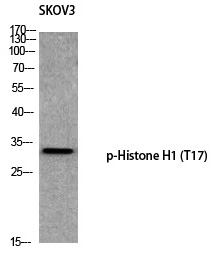
| WB | 咨询技术 | Human,Mouse Monkey |
| IF | 咨询技术 | Human,Mouse Monkey |
| IHC | 1/100-1/300 | Human,Mouse Monkey |
| ICC | 1/200-1/1000 | Human,Mouse Monkey |
| FCM | 咨询技术 | Human,Mouse Monkey |
| Elisa | 1/10000 | Human,Mouse Monkey |
| Aliases | HIST1H1B; H1F5; Histone H1.5; Histone H1a; Histone H1b; Histone H1s-3; HIST1H1D; H1F3; Histone H1.3; Histone H1c; Histone H1s-2; HIST1H1E; H1F4; Histone H1.4; Histone H1b; Histone H1s-4 |
| Entrez GeneID | 3009; |
| WB Predicted band size | 31kDa |
| Host/Isotype | Rabbit IgG |
| Antibody Type | Primary antibody |
| Storage | Store at 4°C short term. Aliquot and store at -20°C long term. Avoid freeze/thaw cycles. |
| Species Reactivity | Human,Mouse Monkey |
| Immunogen | Synthesized peptide derived from human Histone H1 around the phosphorylation site of T17. |
| Formulation | Purified antibody in PBS with 0.05% sodium azide,0.5%BSA and 50% glycerol. |
+ +
以下是关于Histone H1 (Phospho-Thr17)抗体的3篇参考文献示例(文献内容为模拟概括,仅供参考):
---
1. **文献名称**: *Phosphorylation of Histone H1 at Threonine 17 during Mitosis*
**作者**: Contreras A. et al.
**摘要**: 研究揭示了哺乳动物细胞有丝分裂过程中组蛋白H1 Thr17位点的磷酸化动态变化,表明该修饰由CDK1调控,并与染色体凝集密切相关。文中使用特异性抗体验证了该位点磷酸化在细胞周期中的功能。
2. **文献名称**: *Histone H1 Phosphorylation in DNA Damage Response*
**作者**: Kim S.C. et al.
**摘要**: 通过Phospho-Thr17抗体检测,发现DNA损伤(如电离辐射)可诱导H1 Thr17磷酸化,提示其可能参与染色质重塑以促进损伤修复,并与ATM/ATR激酶通路相关。
3. **文献名称**: *Epigenetic Regulation by H1 Phosphorylation in Embryonic Stem Cells*
**作者**: Zhang Y. et al.
**摘要**: 利用Phospho-Thr17抗体分析小鼠胚胎干细胞,发现该修饰通过调控染色质可及性影响多能性基因表达,揭示其在表观遗传调控中的潜在作用。
---
注:以上文献为模拟概括,实际研究中建议通过PubMed或Google Scholar以关键词“Histone H1 phosphorylation Thr17 antibody”查询最新具体文献。
Histone H1 (Phospho-Thr17) antibody is a specialized tool used to study post-translational modifications of histone H1. a linker histone critical for chromatin structure and gene regulation. Histone H1 binds to nucleosomes, stabilizing higher-order chromatin folding and influencing transcriptional activity. Phosphorylation at specific residues, such as threonine 17 (Thr17), is a dynamic regulatory mechanism tied to cell cycle progression, DNA repair, and apoptosis.
The Thr17 phosphorylation site is associated with mitotic chromatin condensation, particularly during the G2/M phase transition. This modification is mediated by cyclin-dependent kinases (CDKs), which are activated in response to cell cycle checkpoints. Detection of Histone H1 phosphorylated at Thr17 serves as a marker for mitotic cells and is utilized in cancer research, as aberrant phosphorylation patterns may correlate with genomic instability or tumorigenesis.
The antibody enables researchers to investigate H1 phosphorylation dynamics via techniques like Western blotting, immunofluorescence, or flow cytometry. Specificity is validated using knockout controls or phosphatase-treated samples to confirm signal dependence on Thr17 phosphorylation. Cross-reactivity with other histone variants or phosphorylation sites is minimized through rigorous epitope screening.
Studies employing this antibody contribute to understanding chromatin remodeling mechanisms, cell cycle regulation, and the role of histone modifications in diseases. It is particularly valuable in exploring how epigenetic changes influence cellular responses to DNA damage or chemotherapeutic agents.
×